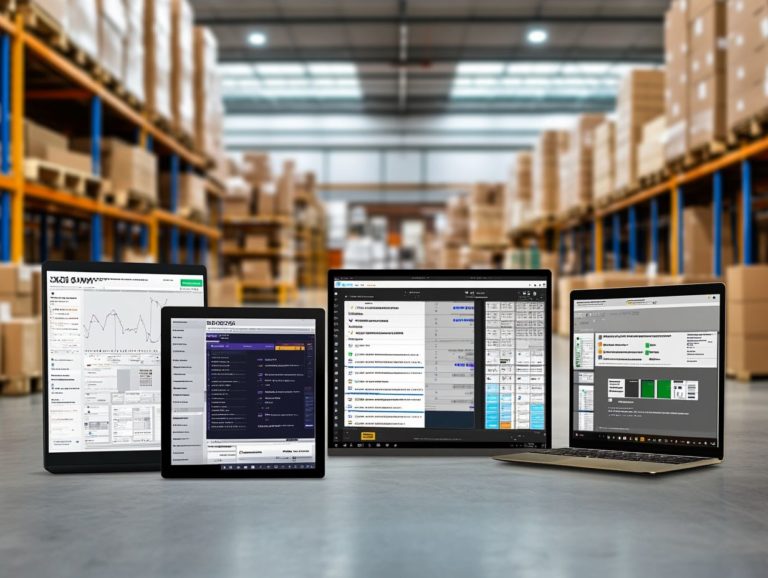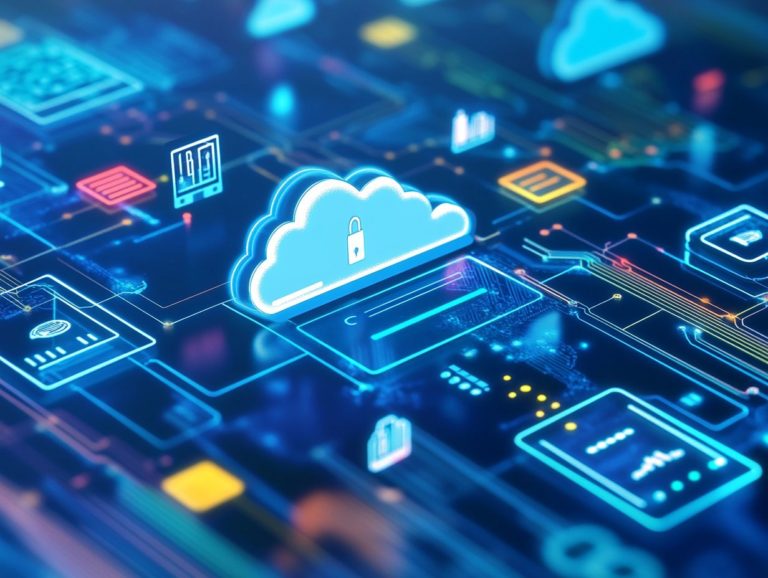How to Navigate International SaaS Compliance
In today’s digital landscape, Software as a Service (SaaS) means software that you access online rather than installing on your computer. It has fundamentally reshaped the way you operate and engage with your clients.
This transformation brings an urgent requirement for compliance with international regulations. Understanding SaaS compliance is not merely about adhering to the law; it s about protecting your company’s reputation and credibility.
This article delves into what SaaS compliance truly means, emphasizes pivotal regulations such as GDPR and CCPA, and offers actionable steps and best practices to help you navigate this intricate landscape with confidence.
By staying proactive, you can avoid potential pitfalls and ensure that your SaaS operations remain compliant and trustworthy.
Contents
- Key Takeaways:
- Understanding SaaS Compliance
- Why International SaaS Compliance is Important
- Key Regulations and Standards for SaaS Compliance
- Steps to Achieve International SaaS Compliance
- Best Practices for Maintaining SaaS Compliance
- Frequently Asked Questions
- What is international SaaS compliance?
- Why is it important to navigate international SaaS compliance?
- What are some common challenges when it comes to international SaaS compliance?
- What are some key considerations when navigating international SaaS compliance?
- How can I ensure my SaaS business is compliant internationally?
- What are the consequences of non-compliance with international SaaS laws?
Key Takeaways:

- SaaS compliance refers to adhering to regulations and standards set by various countries to protect user data and maintain trust in the digital marketplace.
- International SaaS compliance is crucial for businesses to avoid legal and reputational consequences, as well as to expand globally and gain a competitive advantage.
- Achieving international SaaS compliance requires conducting thorough assessments and implementing necessary changes, followed by continuous monitoring and effective handling of non-compliance and data breaches.
Understanding SaaS Compliance
Understanding SaaS compliance is vital for your success! It is crucial in today’s rapidly evolving digital landscape, especially for companies like Chargebee. Compliance involves various regulations and standards that safeguard data protection, financial integrity, and security key elements for fostering business growth and building customer trust.
As regulatory scrutiny intensifies, you must navigate important laws like GDPR, CCPA, HIPAA, and ASC 606. Implement automation tools to streamline your compliance management.
Tony Ricciardella highlights that adopting a proactive approach to compliance not only reduces risks but also enhances operational efficiency and fortifies corporate governance.
What is SaaS Compliance?
SaaS compliance is all about adhering to the regulatory and legal standards that dictate how Software as a Service companies manage data, ensuring both security and financial integrity.
In today’s increasingly digital landscape, where sensitive information flows online, grasping the nuances of SaaS compliance is essential for protecting customer data and maintaining your financial standing.
This compliance mandates that SaaS providers implement robust measures aligned with various frameworks, including the General Data Protection Regulation (GDPR) for personal data protection and the Health Insurance Portability and Accountability Act (HIPAA), which outlines the handling of healthcare information.
By following these regulations, you demonstrate a strong commitment to safeguarding user data while fostering trust with clients and stakeholders. Achieving compliance mitigates risks associated with data breaches and promotes transparency and accountability throughout your organization.
Why International SaaS Compliance is Important
International SaaS compliance is essential for your company as it operates on a global scale. Navigating the intricate web of diverse regulatory landscapes is key to maintaining a stellar reputation and fostering sustainable business growth.
You must also adapt your security policies to align with various international standards, ensuring that you are not just compliant but also competitive in the global SaaS arena.
By taking this proactive approach, you not only protect your data but also build invaluable customer trust. It s crucial for SaaS providers like you to stay ahead of compliance requirements across different regions, from California to markets beyond.
Act now to ensure your business is compliant and ahead of competitors!
Impact on Business Operations and Reputation
Compliance is vital for your business operations and reputation. Non-compliance can lead to hefty fines and damage your brand image.
In today s intricate regulatory landscape, you must navigate a myriad of laws and standards that govern everything from data management practices to financial transactions. By adhering to compliance guidelines, you ensure that your organization can manage sensitive information effectively, reduce the chance of data breaches, and maintain precise financial records.
Neglecting compliance exposes you to large fines. It can also have enduring consequences, such as eroding customer trust and decreasing market competitiveness.
Conversely, a robust commitment to compliance cultivates a favorable organizational image, strengthens stakeholder relationships, and bolsters your overall business resilience.
Key Regulations and Standards for SaaS Compliance

Understanding key regulations and standards like GDPR, CCPA, HIPAA, ISO 27001, SOC 2, and PCI DSS is crucial for you as a SaaS company.
This knowledge not only ensures effective compliance but also upholds financial integrity, setting a solid foundation for your business’s success.
GDPR, CCPA, and Other Relevant Laws
GDPR and CCPA are crucial laws that dictate data protection and privacy for SaaS companies. You must adhere strictly to user consent and data handling practices.
These regulations lay out specific requirements for collecting, storing, and processing personal data, promoting an atmosphere of transparency and accountability.
Under GDPR, you need to establish clear policies that give individuals the power to access, correct, or delete their data. Meanwhile, the CCPA offers California residents similar rights, enhancing their control over personal information.
Both frameworks highlight the importance of keeping users informed about how their data is used, although they differ in scope and enforcement mechanisms.
When you compare these laws to others around the globe, like Brazil’s LGPD or Canada’s PIPEDA, a complex compliance landscape unfolds, significantly influencing how you manage data protection policies across various jurisdictions.
Steps to Achieve International SaaS Compliance
Achieving international SaaS compliance requires a systematic approach. Start with a comprehensive assessment and gap analysis to pinpoint areas where you can enhance how you handle compliance.
This meticulous process ensures that you not only meet regulatory standards but also position your organization for sustained success in a global market.
Assessment and Gap Analysis
Conducting a thorough assessment and gap analysis is your essential first step toward achieving SaaS compliance. This process gives you the power to identify any deficiencies in your current practices.
By systematically evaluating your existing compliance status against relevant standards and regulations, you lay a solid foundation for improvement.
Utilizing methodologies like SWOT analysis (Strengths, Weaknesses, Opportunities, Threats) and frameworks such as NIST and ISO 27001 will provide you with a clearer picture of where you currently stand.
Incorporating tools like compliance management software can further streamline this analysis, delivering real-time insights and automating tracking procedures.
Understanding the specific compliance gaps highlights areas for improvement and informs your strategic planning. This enables you to allocate resources wisely towards compliance initiatives that align with your broader business objectives.
Implementing Necessary Changes
Implementing necessary changes based on assessment findings is crucial for SaaS companies seeking to enhance their compliance management frameworks and align with regulatory standards.
You must update your security policies immediately to stay compliant and improve your data handling measures to protect sensitive information.
By conducting regular audits, you can pinpoint potential gaps and establish stronger controls. Automation will be your ally in streamlining these processes, allowing for real-time monitoring and reporting.
Utilizing automated compliance tools can significantly speed up the adjustment of your policies and enhance oversight of data integrity. This makes it simpler for you to navigate the ever-evolving compliance landscape with confidence.
Start your compliance journey now to secure your business s future!
Best Practices for Maintaining SaaS Compliance

To maintain SaaS compliance, you must adopt best practices that encompass ongoing monitoring, regular audits, and proactive measures.
This approach helps prevent data breaches and ensures continued adherence to regulations.
Ongoing Monitoring and Updates
Ongoing monitoring and timely updates are essential for effective SaaS compliance management. They ensure you stay in tune with the latest regulatory changes.
You can harness advanced technology solutions, such as automated compliance tracking tools, which deliver real-time insights into your regulatory obligations.
Regular audits whether conducted internally or by third-party experts are crucial for pinpointing potential gaps and areas for improvement.
Fostering an adaptable compliance management system is vital. This allows you to modify policies swiftly in response to evolving regulations.
Embracing these strategies helps mitigate risks and cultivates a robust compliance culture that promotes accountability and transparency.
Dealing with Non-Compliance and Data Breaches
Effectively addressing non-compliance and data breaches requires a well-established plan that tackles potential risks head-on and outlines clear response strategies.
Begin with a thorough assessment to identify the severity and scope of the breach. You must quickly notify affected parties and relevant authorities to meet your legal obligations.
After the incident, implementing corrective actions like revising security protocols and enhancing employee training will help prevent future breaches.
Establishing a robust compliance management system is crucial. This framework should incorporate your response strategies, fostering resilience, promoting accountability, and maintaining stakeholder trust in an ever-evolving regulatory landscape.
Frequently Asked Questions
What is international SaaS compliance?
International SaaS compliance refers to ensuring that your software as a service (SaaS) business adheres to the laws and regulations of the countries in which it operates, including data privacy laws, taxation laws, and other legal requirements.

Navigating international SaaS compliance is crucial to avoid legal and financial penalties, maintain a good reputation, and ensure the protection of sensitive data. Non-compliance can result in heavy fines, lawsuits, and damage to your business’s reputation.
What are some common challenges when it comes to international SaaS compliance?
Common challenges include keeping up with constantly evolving laws and regulations, understanding and interpreting complex laws in different countries, and implementing compliance measures across multiple jurisdictions.
Key considerations include understanding the data privacy laws of different countries, ensuring secure data transfer and storage, implementing internal policies and procedures, and regularly reviewing and updating compliance measures.
How can I ensure my SaaS business is compliant internationally?
The best way to ensure compliance is to work with a legal team or consultant who specializes in international SaaS compliance. They can guide you through the process, help you understand the laws and regulations, and assist in implementing the necessary measures for compliance.
What are the consequences of non-compliance with international SaaS laws?
The consequences of non-compliance can vary depending on the severity of the violation and the country in which it occurred. This can include fines, legal action, loss of customers, damage to reputation, and even criminal charges in some cases. Prioritizing compliance is essential to avoid these consequences.
Contact us today to ensure your SaaS is compliant!






